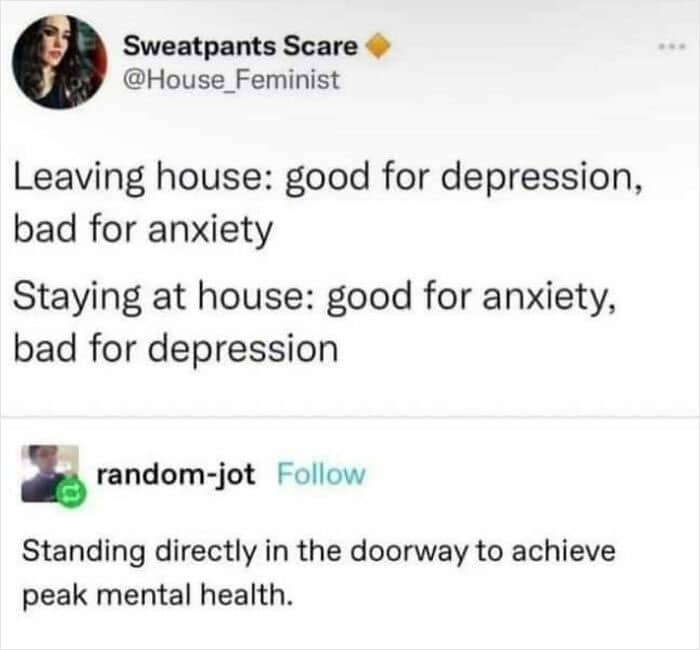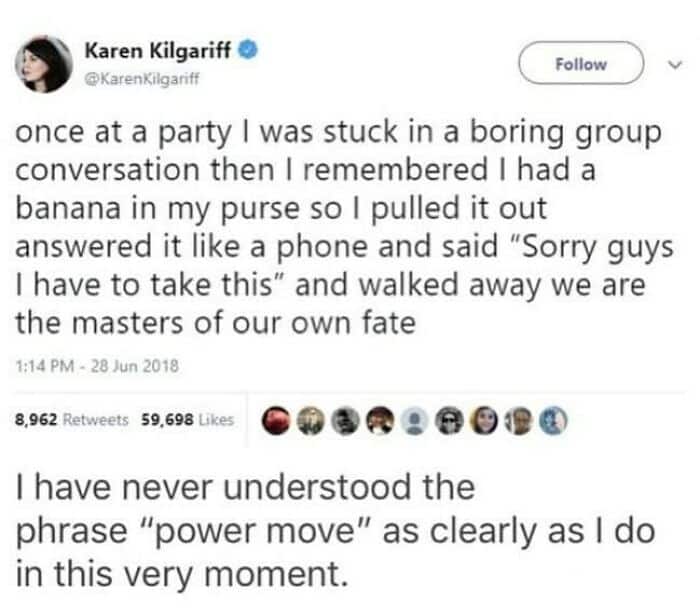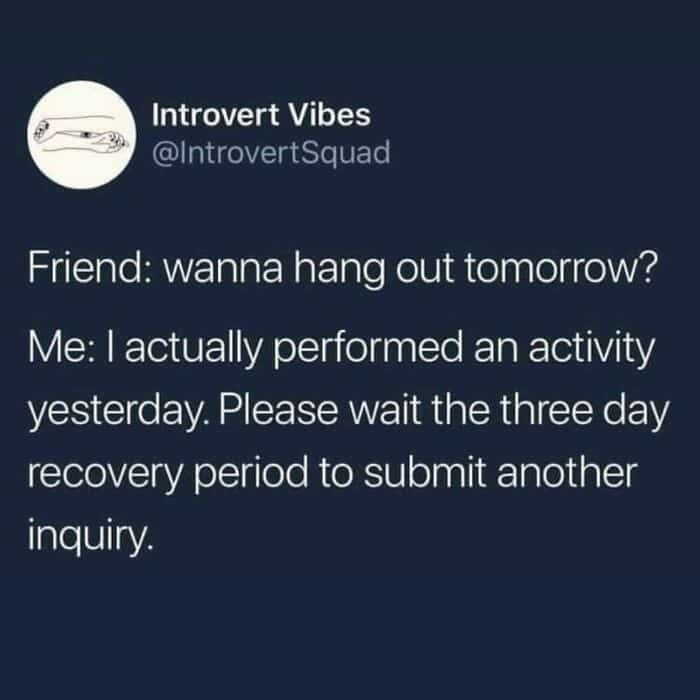We’re not ungrateful if we want to avoid our friends for a day or two. Nor are we defective if our mind goes blank when we meet new people. We’re just (a bit) antisocial.
If you’re one of these people (or simply want to understand your introverted friend better), there’s an Instagram account dedicated to portraying this life in memes.
It’s called FOGO. The acronym stands for The Fear of Going Out, and the one running it says this feeling is completely normal.
#1

#2

The term introversion was popularized by Carl Jung and describes an inwards orientation to one’s own mental life rather than the outward orientation of extroverts to social life. Introverts gain energy from reflection and lose energy in social gatherings.
However, it’s important to point out that most people are neither total introverts nor pure extroverts but display features of both—they are the so-called ambiverts. Almost everyone needs occasional solitude to replenish their energy.
#3

#4

#5

But cultures differ in how they value certain personality traits, and America, for example, likes its extroverts. This society rewards assertiveness and encourages people to speak up.
Experts are guessing that the number of introverts as extroverts is the same, but the former is less visible and certainly less noisy so it’s easy to think they’re the minority.
Introverts are drained by too much social interaction and are the first to leave a party. Even as children, they usually observe first and act later.
#6

#6

#7

Some research claims that the inherent differences between introverts and extroverts lie within the dopamine system in the brain, which makes pleasurable rewards (including social interaction) more salient to extroverts. This suggests that extroverts may be more likely to experience positive emotions.
Even though introverts are generally likely to report lower levels of happiness than extroverts, this does not mean that they are destined to be miserable. The good news is that a consistent theme in happiness research claims our choices and behaviors (the ones that are in our control and changeable) have significant effects on our well-being.
#8

#9

#10

#11

According to Derrick Carpenter, a positive psychology coach at Happify, a helpful tip for those with introverted tendencies is to try to see their whole self. “It’s important to note that the scale on which introversion and extroversion are measured is just that: a scale,” Carpenter wrote in VeryWell Mind. “Within each of us lies some tendency to recharge our batteries through social interaction and affiliation with others and another tendency to recharge on our own. Be honest with yourself about what you need in a given moment and allow yourself permission to have it.”
In other words, when calling a friend to hang out feels right, make a lunch date. But if you’d rather curl up with a good book, go for it.
#12

#13

#14

#15

Carpenter also thinks introverted behavior has an upside that often gets overlooked. “Introverts tend to be better problem solvers, perform better academically, exhibit stronger regulation of their behavior, and are less likely to take risks that may cause them harm,” he said.
“Research shows that introverts may experience these benefits as a result of having more gray matter in their prefrontal cortex, the area at the front of the brain that controls complex and abstract thinking, emotion regulation, and decision making.”
#16

#17

#18

Remember that in many classical and theological perspectives on happiness from Aristotle to the Buddha, spending time alone and contemplating the meaning and purpose of our lives is a necessity.
“Learn to embrace your unique introvert qualities and tap into the happiness they bring you, whether that’s teaching yourself something new, exploring nature on a solo trek, or cultivating your creative side,” Carpenter said.
#19

#20

#21

#22

But when you feel like leaving your safe little cave, own it. “Particularly when you are already going to be socializing, act the part of an extrovert,” Carpenter suggested.
“This doesn’t mean you should be inauthentic. Just bring more of your real self. Be an extroverted introvert. Harness that rich inner world of yours and jump into the conversation more, share your opinion, crack a joke, and take the spotlight every once in a while.”
#23

#24

#25

In fact, studies, where introverts were instructed to act like extroverts in a group of people, showed they ended up experiencing greater positive emotion than introverts acting normally (in fact, they rated their positive emotion higher than the naturally extroverted people, too) and reported feeling more authentic at the moment.
#26

There are plenty of ways to go about it. “If you’re not socializing much, encourage yourself to connect with others in the ways that work well for you,” the psychology coach said.
“Join a group to take part in an activity you already love, like a choir, book club, or fitness class. Even though initiating these decisions may feel like an extra effort, the payoff should be noticeable. When you realize you acted more extroverted in a way that felt good, keep it up.”
Whatever happens in these settings, you will always be able to retreat and find memes to scroll through instead!









